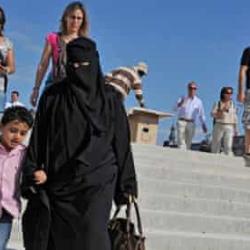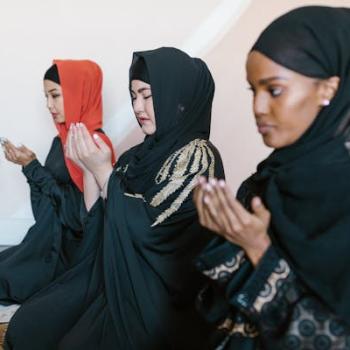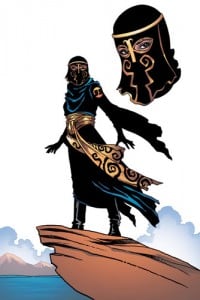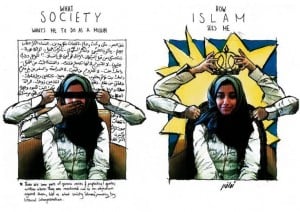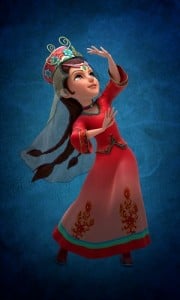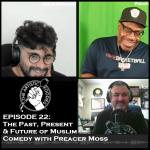In an issue of last month’s X-Factor comic (#217), one of the series’ long-time characters—M, also known as Monet St. Croix—revealed that she was Muslim (“I’m a Muslim and a mutant!”) during anti-Muslim protests in New York City, akin to the ones that took place last year in response to the proposal to build a Muslim community center. The series follows a group of mutant detectives in New York City.

This wouldn’t be the first time that a Marvel comic introduced a Muslim woman character in one of its series. In 2008, Jehanzeb Dar critiqued X-Men’s portrayal of the character Dust in Muslimah Media Watch, an Afghan mutant who was portrayed as a stereotypical, one-dimensional (submissive, meek, burqa wearing for protection from men, unable to engage with fellow male mutants, constantly seeking forgiveness in prayer) Muslim woman. While Dar lauded the appearance of an un-sexualized (in appearance only) Muslimah mutant in a mainstream comic, he remained critical of the underlying stereotypical portrayal of her in X-Men.
While M appears to fit the stereotypical skin-revealing super heroine persona, she does not at first come across as one who is meek or submissive to a stereotypical rendering of her faith. Her Marvel page lists the following powers and abilities:
M’s abilities include superhuman strength and speed, telepathy, flight, nigh-invulnerability, acute night vision, heightened hearing, and the ability to perceive mutants’ auras. Her body’s injuries heal at an accelerated rate…M is extraordinarily intelligent, highly educated, and a formidable hand-to-hand combatant.
X-Factor appears to be a comic with a long-standing theme of inclusion and acceptance of a diverse society: the comic received a GLAAD media award for outstanding comic strip this year. As a spinoff from the popular X-Men comic, which stressed the inclusion of mutants as law-abiding citizens committed to contributing to the well being of society, X-Factor has broadened the definition of diversity to encompass the inclusion and acceptance of not only mutants, but also other individuals who are often marginalized in society. The declaration from author Peter David that one of the characters is Muslim combats the growing anti-Muslim sentiment in society. Death+Taxes Andrew Belonsky writes:
‘X-Factor’ and all the other ‘X-Men’ comic books are inherently political narratives: the whole “mutant-as-outsider” meme always dovetailed nicely with any number of real-life injustices, particularly “mutant-as-black” or “mutant-as-gay.” But this issue gives the ostracization subtext a more pointed and timely angle, clearly linking today’s anti-Muslim attitude with the X-franchise’s fictional anti-mutant sentiment.
The identity politics surrounding when one chooses to disclose their affiliation to a particular group—and under the circumstances in which they choose to do so—has always fascinated me. The path of disclosure is one that is often wrought with a variety of responses from both the individual’s inner and outer circle—which often includes conflict, acceptance, and growth in one’s self-identity. Belonsky says:
Writer Peter David’s message starts to become clear: bigotry, real or imagined, toward Muslims or mutants, goes against the American grain, and treating “different” people like the enemy does the nation no favors.
In media portrayals of Muslim women, disclosure of one’s faith often results in an attempt to immediately “otherize” the woman, attempting to highlight her “difference” from the mainstream. The discourse often dissolves into a superficial obsession with a singular aspect of her faith—usually whether or not she chooses to wear hijab—instead of a more constructive discussion of how her faith contributes to her worldview, the challenges she faces, and self-identity.
There are often only two presentations of opposing extremes: Muslim women who were burqas/niqabs/hijabs and practice their faith and the skin-revealing Muslim women who renounce their religious identity with no room for someone who is somewhere in between the dichotomy.
I’m interested to see how the revelation of M as Muslim will play out in the series over time—will her faith remain in the background of the comic or instead be brought to the forefront? Will she partake in activities widely regarded as stereotypic characteristics of “practicing Muslims” or instead define her faith on her own terms as the series progresses? Will her faith hold more weight than her role as super heroine, or vice-versa? While I’m disappointed with the sexualized portrayal of women in comics in general, for right now I’m excited to see a Muslim mutant super heroine in a Marvel comic who unabashedly declares her faith and can kick some ass.


